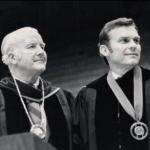 Today my son Matthew and I participated in a walk with the National Alliance on Mental Illness (NAMI). According to Matthew, it was technically a “parade” instead of just a “walk” because a brass band led the march. Mental illness has had a decisive role in shaping my vocation as a pastor. Many of my insights into the human condition come from my experience of severe depression and anxiety throughout most of my twenties. So I wanted to share some of these insights as my contribution to mental illness awareness week and as a super-late participant in the synchroblog organized in conjunction with the release of Sarah Griffith Lund’s new book Blessed Are the Crazy.
Today my son Matthew and I participated in a walk with the National Alliance on Mental Illness (NAMI). According to Matthew, it was technically a “parade” instead of just a “walk” because a brass band led the march. Mental illness has had a decisive role in shaping my vocation as a pastor. Many of my insights into the human condition come from my experience of severe depression and anxiety throughout most of my twenties. So I wanted to share some of these insights as my contribution to mental illness awareness week and as a super-late participant in the synchroblog organized in conjunction with the release of Sarah Griffith Lund’s new book Blessed Are the Crazy.
1. I cannot trust my own mind
One of the most frightening and humiliating aspects of mental illness is the realization that you cannot trust or control your own mind. I knew that the thoughts I was having under depression didn’t make any sense, but I couldn’t turn them off, and that became part of an infinite loop of self-hate: I’m such a worthless piece of crap because I’m sad for no reason and I’m unable to simply recognize the irrationality of this and snap out of it. While I haven’t been under severe depression for almost a decade, I remain an intensively self-critical person. Because of my ADD, it is very rare for me to have a day in which I feel completely productive and successful. For most of my life, I have been very disappointed in myself.
I certainly wouldn’t hold up my self-hate as something to be emulated by others, but the indirect blessing that has come from being such a mess is that I’m genuinely surprised and delighted by God’s grace whenever I do a good job at anything. This happens particularly with my preaching. Most weeks, I don’t deserve to have a good sermon based on the effort that I’ve put into preparing for it. But God somehow seems to bail me out every week. The upside of feeling like a worthless piece of crap all the time as a default is that any achievements I accomplish feel like tremendous gifts from God. I have a very visceral experience of God’s grace. Somehow, not trusting myself has opened me up to a profound sense of being loved by God in the opportunities he gives me to be relevant and useful that I don’t think I would experience if I were too busy cataloging all my achievements as evidence that I deserve to be respected and taken seriously.
2. Faith is living “as if”
Having a broken mind means that I have spent most of my life living inside of the prayer of the man who said to Jesus, “Lord, I believe; help me with my unbelief!” I don’t think I’ve ever entertained atheism seriously. But I definitely go through monsoon and drought seasons regarding the intensity of my experience of God’s presence. And I’m never confident in what I believe. So when God doesn’t feel like he’s there, I simply live as if he’s there. I remember a particularly dark time when I was living in a dilapidated artist’s colony in Toledo, Ohio and I couldn’t see God anywhere. I took out a candle each night, put it on the floor in front of me, and prayed, “God, please clear a space for yourself in my heart” over and over again. It didn’t do a damn thing for many months. But years later, I got chills opening up an old journal and realizing the degree to which God had answered my prayer.
3. Words are often worthless, but time is a precious gift
We think we can fix everything with our words. I often make this mistake as a blogger. But when someone is going through mental illness, words are pretty worthless. I can’t tell you how many people had perfect advice for me when I was going through severe depression. I would nod weakly and try my best to make them feel like they were making a difference and I was taking them seriously. But their words did nothing for me. The greatest gift that I got from people was their time. It was especially wonderful when there was no pressure to make intelligent conversation or show the other person that their time with me was productive and well-spent.
In a period of time when things got bad enough that I had to move back in with my parents, my mom would walk around the neighborhood with me every day. She never got tired of having the exact same conversation over and over again. She simply exuded love and grace. The words weren’t important. And even though I felt for most of that time like I was in an endless tunnel without any light at the end of it, those neighborhood walks were a critical part of my healing. As a pastor, it’s very important to me for people to feel like their time with me is unlimited whenever I go on pastoral visits. If they don’t feel like talking, I sit quietly with them. I wouldn’t know to do that if I had never been depressed.
4. You can go through hell in the midst of heaven
I never really bought into the idea that God is angry enough about people breaking his rules that he would need to torture them forever for the sake of his glory. I struggled with the concept of hell for a long time, until I experienced hell first-hand. It was at a party my fourth year at the University of Virginia when I was in the thick of depression. I looked around the room and saw everyone enjoying each others’ company and heard them reminiscing on all the adventures they’d had together that I hadn’t been a part of. And I felt utterly alone. I realized that I hadn’t gotten close to anyone in college and I was about to graduate. An awesome party is the most miserable place you can possibly be when you feel like a completely unknown outsider. Something inside of me said this is what hell is. So I left and went home.
That’s when it hit me that spending eternity with God would only be heaven if you’ve developed a vulnerable intimacy with God. If God is a threat, if his goodness judges me and makes me insecure, then being around him will be hell, even if God is nothing but loving in how he treats me. My ability to experience heaven is not based upon whether or not I’ve performed some deed that shows I have “faith.” It’s a question of whether or not I have developed enough trust in God that standing before him is not terrifying to me. I think we underestimate the degree to which an intensively loving God will be hard to spend forever with if we haven’t developed enough of a relationship with him.
5. My brokenness is my chosen-ness
Henri Nouwen’s Life of the Beloved was a tremendously decisive book for me that I read in a period of deep darkness in 2002. Nouwen organizes his book around the actions that Jesus takes with the bread that he shares with his disciples at the Last Supper. It says he took the bread, blessed it, broke it, and gave it. So those are the four basic chapters of Nouwen’s book: taken, blessed, broken, and given. With the reverberations of this book echoing in my head, I recall a moment I was in my car pulling out of my parents’ neighborhood, when God said to me, “Your brokenness is your chosen-ness.” It was soon after that when I discovered 1 Corinthians 1:27-28: “He has chosen the weak to shame the strong; he has chosen the foolish to shame the wise; he has chosen the base things of this world — the despised ones and those who are not — to bring to nothing the things that are.”
I claim my brokenness as my election and the one credential which justifies my pastoral vocation. If I had it all together, I might be an excellent administrator, public speaker, and church leader, but I would be unfit for the delicate task of walking with wounded people that I understand to be the most important part of being a pastor. When Isaiah receives his call to be a prophet in Isaiah 6, he says, “Woe is me; I am lost!” before he can say, “Here am I; send me.” Because I was reduced to nothing by my depression, I know that everything I have and do is a gift from God. I have many things to improve upon as a pastor, but my broken life has made me fully dependent on God, and for that dependence I am grateful.
6. Different gospels help different people
One of the things my experience with mental illness has taken away is any investment in there needing to be one truth that everyone agrees on. What I want is for people to find the truth that liberates them from whatever pit they find themselves in. My liberation has come through a particular articulation of the Christian gospel that makes my brokenness into an asset rather than a liability. I come pretty close to saying that God afflicted me with my mental illness in order to shape me for ministry. Speaking that way has been part of my deliverance. It’s not very relevant to me whether it’s objectively true to say that or not.
But I would never tell other people that their mental illness was given to them as part of God’s plan. It’s a question of whether it liberates you to appropriate your experience that way. Somebody else might need to see their mental illness as a “lie” from Satan or a manifestation of fallen creation or simply a biological phenomenon that shouldn’t be given a theological explanation. This is probably what puts me the most at odds with conservative evangelicals and militant atheists alike. I’m not concerned with whether truth is empirically verifiable or logically coherent; I’m concerned with whether it liberates people. And I’m not at all perturbed if different gospels work for different people. Everyone is on a journey in which truths have been organized in a very particular way according to that journey. My task as a pastor is to help people better appropriate the truths that God has already been revealing to them.












